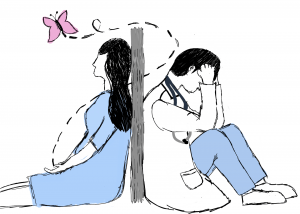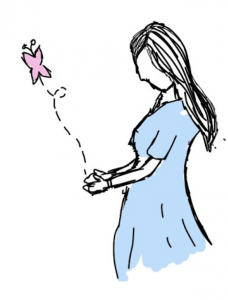Goodbye to the Butterfly
Abstract
The following piece includes two short stories regarding a NICU bereavement room. This room, named the Butterfly Room in my piece, serves as a non-sterile, peaceful, private environment designed as a nursery room where families can say their final goodbyes to their babies after they have passed away. While both short stories describe the same neonatal patient, one is from the perspective of the mother and the other is from the perspective of a neonatology fellow.
I chose to focus on this room after my reflection on a conference I attended during my NICU shadowing experience in the spring. I had never heard of a bereavement room before but learning about its purpose and benefits made me realize its importance for a grieving parent. I was also disturbed because a nurse shared that there were false rumors of a foul smell coming from the room due to a deceased baby’s extended stay in the room.
Since these rooms are relatively new and unknown amongst the general population, I would like to explain their purpose and benefits to those unfamiliar with these rooms through my short stories. I also hope to share the various emotions of both the medical worker and parent regarding the loss of a newborn. In regards to the mother’s perspective, I would like to emphasize how crucial this room is for the emotional needs of grieving parents. In regards to the fellow’s perspective, I would like to explore the limits of empathy in medicine and the origin of rumors in healthcare.
I have used blog posts and stories of women who experienced a miscarriage or stillbirth as inspiration for the mother’s narrative. For the fellow’s narrative, I have used research articles and blog posts to understand a medical worker’s perspective.
Mother – “Saying Goodbye Before I Could Even Say Hello”
I looked up and fixated my eyes on the blue and purple butterfly wall decals on the sky blue walls of the Butterfly Room.  Even though they were stuck to the wall, the way the butterflies were positioned above the crib gave them a sense of freedom, as if they were freely flying away from the bars of the crib. I closed my eyes and rocked slowly back and forth, back and forth, in the rocking chair, cradling my baby for one of the first and last moments I would ever have with her.
Even though they were stuck to the wall, the way the butterflies were positioned above the crib gave them a sense of freedom, as if they were freely flying away from the bars of the crib. I closed my eyes and rocked slowly back and forth, back and forth, in the rocking chair, cradling my baby for one of the first and last moments I would ever have with her.
With my eyes closed, I tried to transport myself to the nursery at home. I imagined myself in the pink rocking chair we had bought from Pottery Barn Kids, the one I had spent countless hours in over the past nine months talking to the human being growing inside of me, waiting for the day we would finally meet. I told her stories of her older brother and shared the memories that I wanted to make with her. Still imagining myself at home, I remembered the rose gold glitter butterfly decorations in our own nursery that I made when I first found out our baby was a girl. They hung over the crib, not flying away from it but instead watching over it. I wanted to keep my eyes closed forever so that I could stay in that happy place and forget the horror of the past twenty-four hours.
I opened my eyes, praying that this was all just one big nightmare. I turned my head and looked over at my husband sitting on the couch just a few feet away from my chair, his head in his hands, eyes closed, tears still falling down his face. His tears were the sharp knife into my chest that reminded me that the past 24 hours weren’t a nightmare; they were our reality.
My mind took me back to this morning when the fellow revealed the cause of my daughter’s death.
“It was a severe placental abruption.”
“Wha- What is that?” I barely managed to get these words out through my tears. My husband was behind me rubbing my back, but in the reflection of the window, I could see him staring at the ceiling trying to hold in his tears.
“Your placenta separated from the lining of your uterus. It disrupts the flow of oxygen and nutrients to the fetus before birth. Did you notice less movement in these past few days?”
“Maybe– I– can’t– remember–” My sobs made it hard to breathe as I tried to remember any memories of feeling her kicks, but I wondered if I had just been imagining them. Why didn’t I notice? Shouldn’t I have known something was wrong, as her cocoon, as her mother?
 My mind came back to the present. My head drooped down until my eyes reached her face. She looked so small. Was my son this small when he was born? I scanned her from top to bottom, from her small tuft of hair to her closed eyes, to her miniature nose, to her tiny lips. My heart yearned to see the slightest movement of any of her features to show she was alive, but my mind knew that she had been declared dead even before she was born.
My mind came back to the present. My head drooped down until my eyes reached her face. She looked so small. Was my son this small when he was born? I scanned her from top to bottom, from her small tuft of hair to her closed eyes, to her miniature nose, to her tiny lips. My heart yearned to see the slightest movement of any of her features to show she was alive, but my mind knew that she had been declared dead even before she was born.
How was I supposed to go back home? How could I tell my son that the sister we were supposed to bring home wasn’t ever going to come? How was I supposed to wash the blood-stained sheets I had woken up to this morning that signaled something had gone very wrong?
No, I needed to stop with these questions. This was my special moment with my daughter. This was the most I was ever going to get.
I stood up from the rocking chair, still clinging onto my daughter, and walked to the changing table. 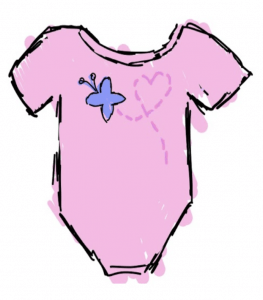 My husband followed me there, grabbing a pink baby onesie from the armoire on the way. Together, we carefully dressed our daughter for the first and last time. The soft onesie had a simple purple butterfly on the chest, its path of flight making a heart right over where our daughter’s heart was. I rested my head on my husband’s chest and stared at my daughter, hoping that I would never forget what she looked like.
My husband followed me there, grabbing a pink baby onesie from the armoire on the way. Together, we carefully dressed our daughter for the first and last time. The soft onesie had a simple purple butterfly on the chest, its path of flight making a heart right over where our daughter’s heart was. I rested my head on my husband’s chest and stared at my daughter, hoping that I would never forget what she looked like.
My husband softly placed his hand on my shoulder and asked, “Is it time?” Without saying anything, I nodded my head softly. I whispered, “Be free,” as I said goodbye to my beautiful butterfly and let her fly away.
Fellow – Bearer of Bad News
“Are you ready?” the attending asked me.
“Can I practice one more time?”
“Okay. Last time.”
“It’s a severe placental abruption. Your placenta separated from the lining of your uterus, which disrupts the flow of oxygen and nutrients to the fetus before birth.”
“A little too fast. You need to give the parents time to process the information. Wait a few seconds after the first sentence before you give the explanation.”
“Okay.”
“Be direct, but don’t be cold. We want to be there for the parents.”
“Okay”
“Let’s go in then”
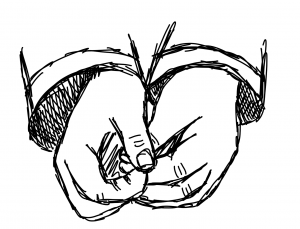 I could feel my hands starting to sweat as I knocked and slowly opened the door. I quickly pumped some hand sanitizer into my hands before entering the room. The hand sanitizer felt cool against my warm, trembling hands.
I could feel my hands starting to sweat as I knocked and slowly opened the door. I quickly pumped some hand sanitizer into my hands before entering the room. The hand sanitizer felt cool against my warm, trembling hands.
By this point, you would think that I would have gotten used to being the bearer of bad news, after all my years of training, but honestly, I still don’t think I can do it. How do you tell parents who have been waiting for so long that they will never get to bring their baby home? How do you explain to parents why they will never get to meet their baby?
I walked into the room and saw the mother sitting up in bed, her hands rubbing her enlarged stomach. Her husband stood next to her, rubbing her back.
I started my introduction, “Hi, I’m Dr. Miller. How are you doing today?” The parents looked at me with dazed and exhausted faces. Why? Why did I ask that? I already knew this day was most likely the worst day of their lives.
I just continued without giving them a chance to respond.
“By the time you arrived at the hospital and we ran our tests, your baby no longer had a heartbeat. It was a severe placental abruption.”
I waited a few seconds.
“Your placenta separated from the lining of your uterus. It disrupts the flow of oxygen and nutrients to the fetus before birth. Did you notice less movement in these past few days?”
The mother started sobbing. The father turned his head away and put one hand over his eyes to cover his tears.
I bit my lower lip to distract myself. I thought I would have gotten used to this by now. I think I’ve gotten better, I don’t tear up anymore, but what I’ve learned over the past few years is something like this will never be easy.
After some more discussion, our team left the room to give them privacy before we would induce labor to push the fetus out.
Later in the day, I sat at my desk in the fellow’s workroom catching up on paperwork and calls. I tried to fill my mind with work to help push my emotions aside. The first few times I had to be the bearer of bad news, I couldn’t stop replaying my conversations in my head. It was exhausting. I hated thinking of the countless ways I could have relayed the information in a better way, maybe more clearly, or more empathetically. Doing work instead helps me be more productive. 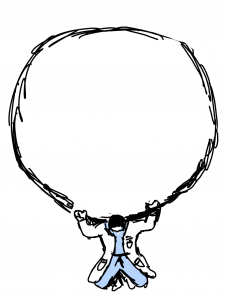 As much as I want to give a moment of silence for all of my patients who didn’t make it, it hurts to focus on the patients that I failed rather than the ones that I have helped. The emotional burden of thinking of these babies is sometimes too much for me to bear.
As much as I want to give a moment of silence for all of my patients who didn’t make it, it hurts to focus on the patients that I failed rather than the ones that I have helped. The emotional burden of thinking of these babies is sometimes too much for me to bear.
Another thing that I’ve found helps take my mind away is working in the fellows workroom, rather than at the station across from the Butterfly Room, where I used to fill out my paperwork. Sitting there, you catch the conversations of many medical workers, and you hear rumors about the room and the people who use that room from other medical staff. Some fellow told me it smells like death in there, and I’ve heard nurses joke that it’s haunted with the spirits of all the babies who have been in there.
Honestly, I have always been uncomfortable with the idea of the Butterfly Room. I know that these rumors about the lingering smell of death aren’t true; I’ve spent enough time in there myself to know that. These rumors are false and rude, but it actually somehow helps. It is like our coping mechanism for dealing with this uncomfortable room. I know there aren’t ghosts in there, but it’s easier to think about those than about the weeping parents and their dead babies.
Working in the NICU is hard. Seeing a baby graduate, alive and healthy, from the NICU is one of the most rewarding experiences anyone could ever have, but as all medical fields experience, there are good patient outcomes but there are also unfortunate ones. I wanted to work in the NICU to build those personal connections with parents and babies, but it is easier to deal with the loss when I don’t feel emotionally tied to that family.
Maybe one day I’ll find that balance between personal connections and emotional self-protection. I guess I have plenty of years ahead of me to search for it. For now, it’s back to paperwork for me.
References
Crowe, Suzanne, Shayla Sullivant, Laura Miller-Smith, and John D. Lantos. “Grief and Burnout in the PICU.” American Academy of Pediatrics. American Academy of Pediatrics, May 1, 2017. https://pediatrics.aappublications.org/content/early/2017/04/14/peds.2016-4041.
Georganta, Katerina, Efharis Panagopoulou, and Anthony Montgomery. 2014. “Talking behind their backs: Negative gossip and burnout in Hospitals.” Burnout Research 1 (2): 76-81. https://doi.org/https://doi.org/10.1016/j.burn.2014.07.003. http://www.sciencedirect.com/science/article/pii/S2213058614000242.
Neskov, Lindsay. “Lindsay’s Story.” Through the Heart (blog), April 8, 2019. https://www.throughtheheart.org/lindsays-story/.
Samra, Rajvinder. 2018. “Empathy and Burnout in Medicine—Acknowledging Risks and Opportunities.” Journal of General Internal Medicine 33 (7): 991-993. https://doi.org/10.1007/s11606-018-4443-5.
Torres, Leigh Ann. “Tell the Story of Your Grief.” Hand to Hold: Fragile Babies. Family Support. (blog), October 14, 2019. https://handtohold.org/tell-the-story-of-your-grief/.
“Willow’s Birth Story.” Just Another Mommy Blog (blog), January 25, 2018. https://www.justanothermummyblog.com/willows-birth-story-placenta-abruption/.
Wilson, Heather. “Surviving Stillbirth.” Kennedy’s Angel Gowns (blog), January 1, https://kennedysangelgowns.org/kennedy-milan-wilson/.
